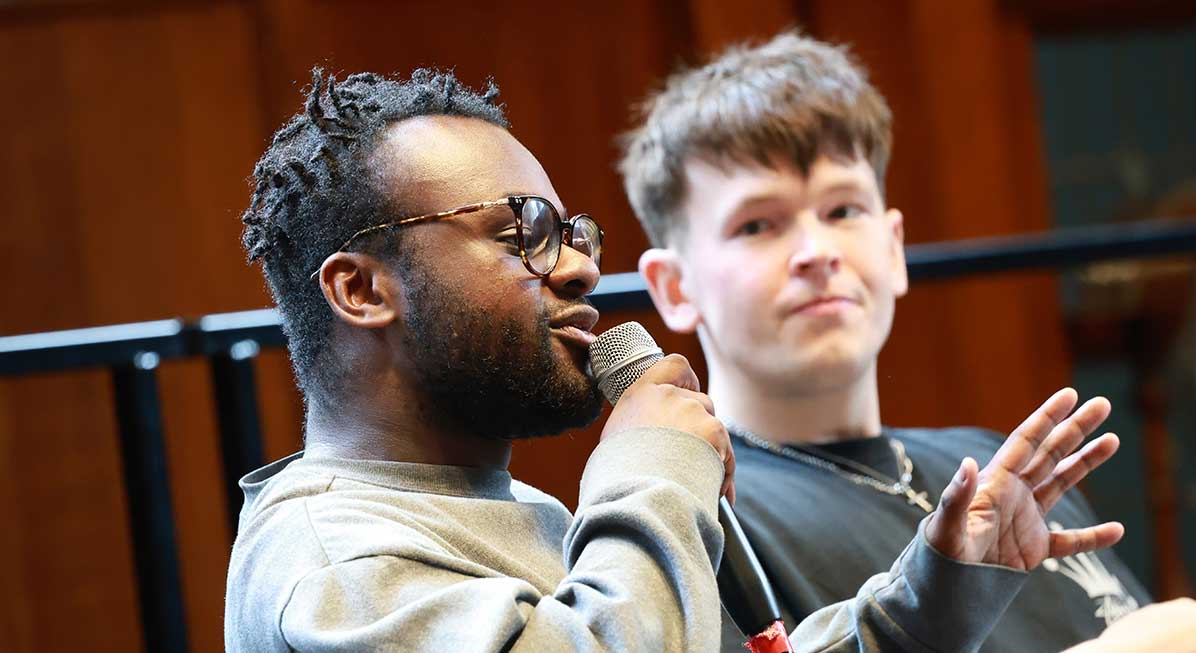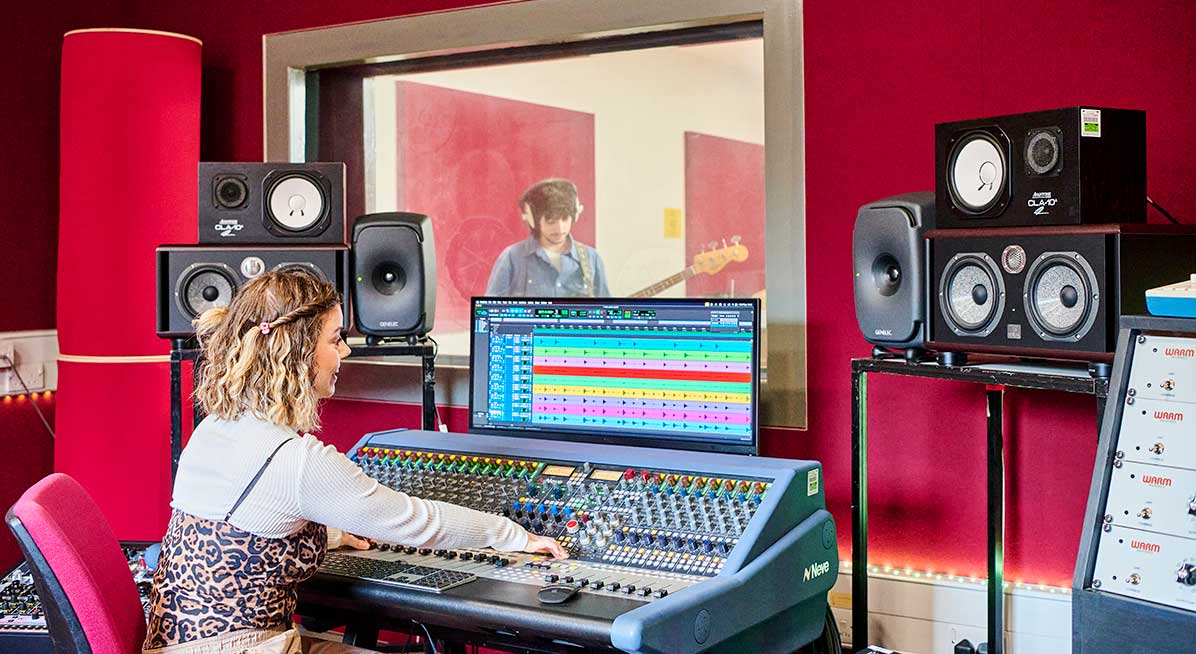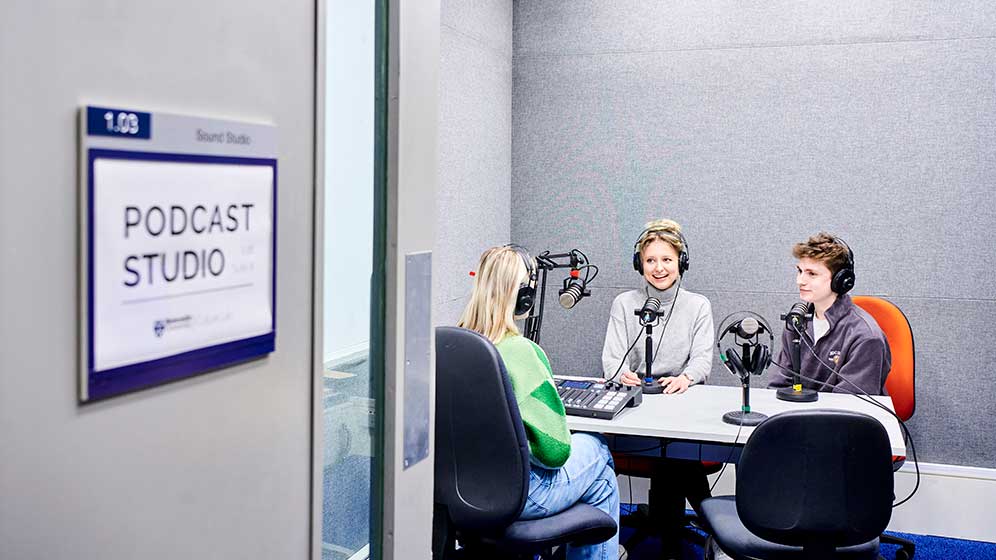Creative and Cultural Industries Management MA
Develop the knowledge, skills, and practical experience to thrive in the fast changing, global creative cultural industry.
You are currently viewing course information for entry year:
Start date(s):
- September 2026
Overview
Blend academic insights with real-world experience. Develop expertise and confidence in fields such as music, heritage, tourism and media.
On our Creative Cultural Industries Management MA you'll learn how to lead change and drive growth in a variety of sectors, whether in public, private, or non-profit organisations.
Learn about the key concepts, topics, and skills through modules taught at the School of Arts and Cultures and the triple accredited (EQUIS, AACSB, and AMBA) Newcastle University Business School.
You'll also draw upon expertise from research expertise in the wider University community, including the Creative Industries Policy and Evidence Centre (Creative PEC), which is led by Newcastle University Business School in collaboration with the Royal Society of Arts
Creative PEC provides independent research and policy recommendations for the creative industries.
Our programme has one general, and four specialist pathways. You can select a pathway to suit your individual needs, background and career aspirations. As well as the main ‘Creative and Cultural Industries Management’ pathway, you can choose from:
- Music Enterprise
- Tourism and Heritage
- Writing for the Cultural Sector
- Artificial Intelligence
We have strong partnerships with local and national media, digital studios, creative and cultural organisations. These include University strategic partners such as:
- The Glasshouse
- Opera North
- Tyne and Wear Archives and Museums
You’ll engage with guest speakers including Community Interest Companies (CICs) from the sector, addressing social justice and increasing inclusivity and access to the arts.
In semester 2, you’ll tailor your learning to your aspirations and career goals.
On your final project you'll either focus on an individually designed research topic (an 8,000-word journal article) or a research topic set by a range of external organisations and freelancers (an 8,000-word professional report).
You’ll be studying in a vibrant city campus with easy access to a rich cultural and creative scene. Newcastle is a city with excellent transport links to key creative and media hubs, and less than 3 hours by train from London.
 Photo credit Malthe Folke Ivarsson
Photo credit Malthe Folke Ivarsson
Important information
We've highlighted important information about your course. Please take note of any deadlines.
Please rest assured we make all reasonable efforts to provide you with the programmes, services and facilities described. However, it may be necessary to make changes due to significant disruption, for example in response to Covid-19.
View our Academic experience page, which gives information about your Newcastle University study experience for the academic year 2025-26.
See our terms and conditions and student complaints information, which gives details of circumstances that may lead to changes to programmes, modules or University services.
What you'll learn
During your course, you’ll explore:
- Industry trends analysis: understand the evolution of creative industries and using research methods to tackle current challenges
- Adapting to change: navigate social, cultural, and technological shifts in the sector
- Global & institutional contexts: recognise how creative industries intersect with cultural, legal, and political frameworks
- Ethical research & policy: apply research methodologies and understanding economic, policy, and legal frameworks, including intellectual property
- Strategic thinking & problem-solving: develop analytical and planning strategies to drive innovation.
- Cross-disciplinary & entrepreneurial skills: work across disciplines to foster creativity, and apply entrepreneurial approaches
- Communication & leadership: refine writing, speaking, and collaboration skills to advocate for the industry and engage with audiences
- Project & stakeholder management: learn how to plan and execute projects, manage teams, and work with stakeholders
- Cultural & audience engagement: understand marketing, event management, and policy evaluation to drive cultural participation
- Professional development: develop reflective skills, leadership, adaptability, and self-awareness for your long-term career success
Modules
You will study modules on this course. A module is a unit of a course with its own approved aims and outcomes and assessment methods.
The module information below is intended to provide an example of what you will study.
Our teaching is informed by research. Course content changes periodically to reflect developments in the discipline, the requirements of external bodies and partners, and student feedback.
Full details of the modules on offer will be published through the Programme Regulations and Specifications ahead of each academic year. This usually happens in May.
To find out more please see our terms and conditions.
Optional modules availability
Some courses have optional modules. Student demand for optional modules may affect availability.
Full-Time (1 year)
You'll take the following compulsory modules:
You'll take TWO of the following modules to a value of 40 credits. If you want to pursue one of the named pathways, you must take 40 credits from within that pathway:
Music Enterprise Pathway
| Optional modules | Credits |
|---|---|
| Music & the Creative Economy: Concepts and Practices | 20 |
| Live Music Events: Management Marketing and Practice | 20 |
Tourism and Heritage Pathway
| Optional modules | Credits |
|---|---|
| Cultural Heritage and Tourism | 20 |
| Management Practices in Museums, Galleries and Heritage Studies | 20 |
| Heritage Matters | 20 |
Writing for the Cultural Sector Pathway
| Optional modules | Credits |
|---|---|
| The Profession of Writing | 20 |
| Freelancing in Media and Communications | 20 |
| Art Writing | 20 |
| The Power of Film Criticism | 20 |
Artificial Intelligence Pathway
| Optional modules | Credits |
|---|---|
| Social Media: Communication, Innovation and Ethics | 20 |
| AI Culture and Society | 20 |
Additional (Non-Pathway) Options
| Optional modules | Credits |
|---|---|
| Cultures of Data Visualisation | 20 |
| International Media and Law | 20 |
| Digital communication for cultural institutions and organisations | 20 |
Part-Time (2 years)
Year 1
You'll take the following compulsory modules:
| Compulsory modules | Credits |
|---|---|
| Creative and Cultural Sector: Past, Present, Future | 20 |
| Creative Industries, Policy, Intellectual Property and AI | 20 |
| Creative Industry Consulting Project | 20 |
You'll also take a further module from the pathway modules listed above. If you want to pursue one of the named pathways, you must select 20 credits from within that pathway in both years of the degree.
Year 2
You'll take the following compulsory modules:
| Compulsory modules | Credits |
|---|---|
| Introduction to Research for Professional Practice | 20 |
| Final Research Project | 60 |
You'll also take a further module from the pathway modules listed above. If you who want to pursue one of the named pathways, you must have taken 40 credits from within that pathway by the end of the degree.
| Compulsory Modules | Credits |
|---|---|
| Music Research Project | 60 |
| Creative and Cultural Sectors: Past, Present, Future | 20 |
How you'll learn
Our learning and teaching is student-centred. You'll complete a combination of compulsory and optional modules through:
- lectures
- seminars
- practical workshops
We also have a series of challenging guest lectures, master classes and workshops from experts and innovators in the creative sector.
The one-year course is divided into three semesters. You'll have assignments to complete and submit during the intervening weeks

Depending on your modules, you'll be assessed through a combination of:
- Case study
- Essay
- Observation of professional practice
- Oral presentation
- Portfolio
- Report
Throughout your studies, you’ll have access to support from:
- academic staff
- personal tutors and research supervisors
- our University Student Services Team
- student representatives
- peers
You'll also be assigned an academic member of staff, who will be your personal tutor throughout your time with us. They can help with academic and personal issues.
Your teaching and learning is also supported by Canvas. Canvas is a Virtual Learning Environment. You'll use Canvas to submit your assignments and access your:
- module handbooks
- course materials
- groups
- course announcements and notifications
- written feedback
Your future
Careers
Benefiting from our extensive range of creative and cultural partners, you’ll gain first-hand experience from experts in this fast-growing sector. You'll be prepared for a career in a range of industries including:
- Visual and performing arts
- performing arts
- Music management
- film and digital media
- policy and leadership
Further Study
This course provides a route into PhD level study.
Our Careers Service
Our Careers Service is one of the largest and best in the country, and we have strong links with employers. We provide an extensive range of opportunities to all students through our ncl+ initiative
Visit our Careers Service website
Our Careers Service
Our expert Careers Service is here to help you take the next steps in your professional life. We will support you while you’re studying with us and for up to three years after you graduate.
You will have access to expert one-to-one advice and guidance through our campus careers centre and online, along with digital resources, workshops, networking opportunities, and careers and recruitment events.
We’ve been awarded 5 QS Stars for Student Employability (2025). Many of our degrees are shaped by strong links with national and international businesses. We are committed to helping you access real-world experience opportunities and develop key skills through paid work placements and internships.
Quality and ranking
All professional accreditations are reviewed regularly by their professional body
If you’re studying an accredited degree and thinking about working in Europe after you graduate, the best place to find current information is the UK Government’s guidance on recognition of UK professional qualifications in EU member states. This official resource explains whether your profession is regulated in another country, what steps you need to take, and which organisation you should contact.
Facilities
The programme takes advantage of the School’s industry-facing, multi-purpose and flexible facilities. They allow students maximum creative freedom and development in their studies.
You’ll have access to:
- high-spec computing facilities
- latest creative software
- professional audio
- other media production equipment
as well as a team of highly-skilled technicians with expertise in creative production to support all practical projects.

Photo credit John Donoghue

Photo credit John Donoghue
Fees, Funding and Scholarships
Tuition fees for 2026 entry (per year)
As a general principle, you should expect the tuition fee to increase in each subsequent academic year of your course, subject to government regulations on fee increases and in line with inflation.
Depending on your residency history, if you’re a student from the EU, other EEA or a Swiss national, with settled or pre-settled status under the EU Settlement Scheme, you’ll normally pay the ‘Home’ tuition fee rate and may be eligible for Student Finance England support.
EU students without settled or pre-settled status will normally be charged fees at the ‘International’ rate and will not be eligible for Student Finance England support. You may be eligible for a scholarship worth 25% off the international fee. Search our funding database.
If you are unsure of your fee status, check out the latest guidance here.
Scholarships
We support our EU and international students by providing a generous range of Vice-Chancellor's automatic and merit-based scholarships. See our searchable postgraduate funding page for more information.
What you're paying for
Tuition fees include the costs of:
- matriculation
- registration
- tuition (or supervision)
- library access
- examination
- re-examination
- graduation
Find out more about:
If you are an international student or a student from the EU, EEA or Switzerland and you need a visa to study in the UK, you may have to pay a deposit.
You can check this in the How to apply section.
If you're applying for funding, always check the funding application deadline. This deadline may be earlier than the application deadline for your course.
For some funding schemes, you need to have received an offer of a place on a course before you can apply for the funding.
Search for funding and scholarships
Find funding available for your course
Entry requirements
The entrance requirements below apply to 2026 entry.
Qualifications from outside the UK
English Language requirements
Admissions policy
This policy applies to all undergraduate and postgraduate admissions at Newcastle University. It is intended to provide information about our admissions policies and procedures to applicants and potential applicants, to their advisors and family members, and to staff of the University.
University Admissions Policy and related policies and procedures
Credit transfer and Recognition of Prior Learning
Recognition of Prior Learning (RPL) can allow you to convert existing relevant university-level knowledge, skills and experience into credits towards a qualification. Find out more about the RPL policy which may apply to this course
How to apply
Using the application portal
The application portal has instructions to guide you through your application. It will tell you what documents you need and how to upload them.
You can choose to start your application, save your details and come back to complete it later.
If you’re ready, you can select Apply Online and you’ll be taken directly to the application portal.
Alternatively you can find out more about applying on our applications and offers pages.
Apply Online
Open days and events
Find out about how you can visit Newcastle in person and virtually
Overseas events
We regularly travel overseas to meet with students interested in studying at Newcastle University.
Get in touch
Questions about this course?
If you have specific questions about this course you can contact:
Matthew Ord Matthew.Ord@newcastle.ac.uk
Degree Programme Director (DPD)
General enquiries
For more general enquiries, you could also complete our online enquiry form.
Application enquiries
If you've got a question about your application, send us an enquiry via the application portal you applied through.
If you haven't applied yet, you can send your questions via our enquiry form.
Live chat
Our Ncl chatbot might be able to give you an answer straight away. If not, it’ll direct you to someone who can help.
You'll find our Ncl chatbot in the bottom right of this page.
Chat to our students
Choosing a university is a big decision. If you've got questions about a particular course, student life or the city of Newcastle, why not chat to our friendly students or graduates!
Keep updated
We regularly send email updates and extra information about the University.
